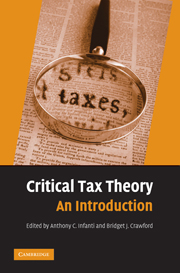Book contents
- Frontmatter
- Contents
- List of Illustrations
- List of Tables
- List of Contributors
- List of Common Abbreviations
- Introduction
- CHAPTER 1 FOUNDATIONS OF CRITICAL TAX THEORY
- CHAPTER 2 HISTORICAL PERSPECTIVES ON TAXATION
- CHAPTER 3 THE GOALS OF TAX POLICY
- CHAPTER 4 CRITICAL TAX THEORY MEETS PRACTICE
- CHAPTER 5 RACE AND TAXATION
- CHAPTER 6 GENDER AND TAXATION
- CHAPTER 7 SEXUAL ORIENTATION AND TAXATION
- CHAPTER 8 THE FAMILY AND TAXATION
- CHAPTER 9 CLASS AND TAXATION
- CHAPTER 10 DISABILITY AND TAXATION
- CHAPTER 11 GLOBAL CRITICAL PERSPECTIVES ON TAXATION
- Toward a Global Critical Feminist Vision: Domestic Work and the Nanny Tax Debate
- The Taxation of Undocumented Immigrants: Separate, Unequal, and Without Representation
- Prying Open the Closet Door: The Defense of Marriage Act and Tax Treaties
- Missing Africa: Should U.S. International Tax Rules Accommodate Investment in Developing Countries?
- Global Trajectories of Tax Reform: The Discourse of Tax Reform in Developing and Transition Countries
- CHAPTER 12 CRITICAL PERSPECTIVES ON CRITICAL TAX THEORY
- Index
Global Trajectories of Tax Reform: The Discourse of Tax Reform in Developing and Transition Countries
Published online by Cambridge University Press: 04 August 2010
- Frontmatter
- Contents
- List of Illustrations
- List of Tables
- List of Contributors
- List of Common Abbreviations
- Introduction
- CHAPTER 1 FOUNDATIONS OF CRITICAL TAX THEORY
- CHAPTER 2 HISTORICAL PERSPECTIVES ON TAXATION
- CHAPTER 3 THE GOALS OF TAX POLICY
- CHAPTER 4 CRITICAL TAX THEORY MEETS PRACTICE
- CHAPTER 5 RACE AND TAXATION
- CHAPTER 6 GENDER AND TAXATION
- CHAPTER 7 SEXUAL ORIENTATION AND TAXATION
- CHAPTER 8 THE FAMILY AND TAXATION
- CHAPTER 9 CLASS AND TAXATION
- CHAPTER 10 DISABILITY AND TAXATION
- CHAPTER 11 GLOBAL CRITICAL PERSPECTIVES ON TAXATION
- Toward a Global Critical Feminist Vision: Domestic Work and the Nanny Tax Debate
- The Taxation of Undocumented Immigrants: Separate, Unequal, and Without Representation
- Prying Open the Closet Door: The Defense of Marriage Act and Tax Treaties
- Missing Africa: Should U.S. International Tax Rules Accommodate Investment in Developing Countries?
- Global Trajectories of Tax Reform: The Discourse of Tax Reform in Developing and Transition Countries
- CHAPTER 12 CRITICAL PERSPECTIVES ON CRITICAL TAX THEORY
- Index
Summary
MAPPING AGENCIES AND PROCESSES OF GLOBAL TAX REFORM
The Influence of Developed Country Governments
Historically, developed countries influenced tax systems through imperial relationships. Although it has not been comprehensively surveyed, the importance of colonial influence on the tax systems of developing countries is widely recognized by tax reformers. Even countries that were not colonized modified their legal and economic regimes, including tax laws, by adopting reforms based on those of aggressive countries.
Contemporary tax laws of developed countries have also had a significant influence on the structure of tax regimes in other countries. A well-known example of this phenomenon is the importance of the U.S. foreign tax credit, which allows a credit against U.S. income tax due from American corporations and individuals who invest offshore and are subject to foreign income taxes. The credit only applies to those foreign taxes that have the “predominant character” of an income tax as defined by the United States. Various countries, including Mexico, have considered structuring their taxes to ensure that they will be creditable against the U.S. income tax in order to encourage U.S. investment.
A second means of developed country influence over tax law and policy in developing and transition countries has been through the negotiation of bilateral tax treaties. More powerful countries can typically extract significant concessions in this process. In addition, the form of tax treaties was developed by reference largely to tax laws of developed countries and the shape of international commerce among those countries. The rules apply to particular kinds of income – business profits, rents, royalties, interest, dividends – in a format that is based on dominant developed country norms of taxation, reflecting the tax mix in most developed countries.
- Type
- Chapter
- Information
- Critical Tax TheoryAn Introduction, pp. 354 - 362Publisher: Cambridge University PressPrint publication year: 2009

